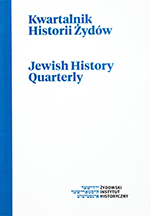Kampania wyborcza Romana Dmowskiego do IV Dumy Państwowej w Warszawie w 1912 roku. Przyczynek do studiów nad mobilizacją nacjonalistyczną
Roman Dmowski's Election Campaign to the 4th State Duma in Warsaw in 1912. A Contribution to Studies of Nationalist Mobilization
Author(s): Grzegorz KrzywiecSubject(s): History
Published by: Żydowski Instytut Historyczny
Keywords: moral panic; National Democracy; political anti-Semitism; politics of fear; political mobilization; Polish Jewish relations
Summary/Abstract: The article examines the relationship between rhetoric and political praxis, and is positioned at the intersection of intellectual, cultural, and socio-political history of Polish lands at the beginning of the 20th century. The paper points to two intermingled processes: firstly and shortly, on a creation by the National Democrats (Endecja) politics of fear and anti-Left hysteria both around a putting down the Revolution of 1905 and the elections to the Russian Duma (1906, 1907) in Russian Poland, and secondly and primarily on a radicalization of the Endecja’s line towards the Jews and so called ‘Jewish question’ at the end of the first decade of the 20th Century. Eventually for the Endecja, both a leading Polish political party and the largest nationalist movement of Eastern Europe of the day, this politics of collective paranoia meant not only a tool for political mobilization, but as well a mechanism for an exclusion of all the ‘non–Polish’ groups from the national collectivity. The author analyzes at length Roman Dmowski's campaign to the 4th Duma in Warsaw in 1912 as a case study of moral panic campaign and claims that both the elaborately and meticulously organized electoral practices of the latter and his stuff and the anti-Jewish boycott afterwards gave the Endecja an opportunity to reintegrate different varieties of its policies into one propaganda war machine against multi-faced ‘Jewish threat’ and all political rivals. Eventually the author argues that the political experience of those days had a long-lasting impact not only on the Endecja’s policies, but also became a pivotal point for the whole Polish political scene in the early 20th Century
Journal: Kwartalnik Historii Żydów
- Issue Year: 253/2015
- Issue No: 01
- Page Range: 22-52
- Page Count: 31
- Language: Polish

